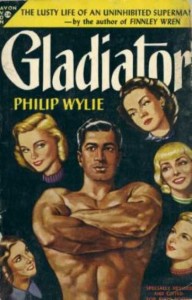 Philip Wylie is perhaps best known for his novel When Worlds Collide, which was made into a big budget special-effects extravaganza by producer George Pal.
Philip Wylie is perhaps best known for his novel When Worlds Collide, which was made into a big budget special-effects extravaganza by producer George Pal.
But every year, it becomes more apparent that his most influential novel by far was the first one he ever wrote (but his third published), titled Gladiator.
Gladiator is the story of Hugo Danner, who is made the subject of a biological experiment by his father, Abednego Danner. The elder Danner has developed a serum that will allow any organism immense strength and near invulnerability, and it is that serum which he uses on his pregnant wife and unborn child. If you think that’s an unconscionable thing to do, well, Hugo isn’t too thrilled with it, either.
The book charts Hugo’s life from lonely youth to invincible soldier to disillusioned veteran and details the immense difficulties suffered by a man with apparently insurmountable advantages. Hugo is no hero, and his life does not serve as a shining example to us all. The book is, in fact, kind of a downer and did not enjoy great success in its first publication.
So why write about it at all? Because in 1938, a character appeared in the first issue of Action Comics who drew inspiration from Hugo Danner and changed the American pop culture landscape. That character, of course, was Superman.
Although Jerry Siegel denied the influence, it is obvious. For instance, when Abednego Danner is first describing his process to his wife, he says:
“Why not?” he said. “Look at the insects–the ants. Strength a hundred times our own. An ant can carry a large spider–yet an ant is tissue and fiber, like a man. If a man could be given the same sinews–he could walk off with his own house.”
“Ha ha! There’s a good one. And you would make a splendid piano-mover, Abednego.”
“Pianos! Pooh! Consider the grasshoppers. Make a man as strong as a grasshopper–and he’ll be able to leap over a church. I tell you, there is something that determines the quality of every muscle and nerve. Find it–transplant it–and you have the solution.”
Compare that to this description of the source of Superman’s great power from Action Comics #1.
Ants and grasshoppers. Awfully coincidental, wouldn’t you say?
Or how about this moment as Abednego is explaining the facts of life as a super-powered man to his young son (and notice how Hugo compares his body to metal–not steel, but iron):
“Sure. I’m like a man made out of iron instead of meat.”
“That’s it, Hugo. And, as you grow up, you’ve got to remember that. You’re not an ordinary human being. When people find that out, they’ll–they’ll–”
“They’ll hate me?”
“Because they fear you. So you see, you’ve got to be good and kind and considerate–to justify all that strength. Some day you’ll find a use for it–a big, noble use–and then you can make it work and be proud of it. Until that day, you have to be humble like all the rest of us. You mustn’t show off or do cheap tricks. Then you’d just be a clown. Wait your time, son, and you’ll be glad of it. And–another thing–train your temper. You must never lose it. You can see what would happen if you did? Understand?
Compare that to this panel of Superman’s revised origin from Superman #1.
So both Clark Kent and Hugo Danner were raised on farms where their fathers taught them to keep their great strength hidden to avoid the fear and hatred of their fellow men, and both demonstrate strength proportional to ants and grasshoppers. But there’s no influence there.
But then there’s this…
When Hugo first discovers his powers, he goes out into the woods by himself and begins to travel by taking great leaps across the countryside. He doesn’t lift cars as a child, choosing boulders instead, but there is a scene where he lifts a car and turns it around so it’s pointing the other way. He is stated as being unable to outrun a train. And then there’s this, the only thing that is alluded to that might be able to penetrate his invulnerable skin:
The red sky in the southeast became redder with the rising sun. Hugo remained close to the wall. It was no novelty for him to be under shell fire. But at such times he felt the need of a caution with which he could ordinarily dispense. If one of the steel cylinders found him, even his mighty frame might not contain itself. Even he might be rent asunder.
So yes, according to the book, Hugo is worried that he might be injured by an artillery shell, just as is explicitly stated in the Superman caption.
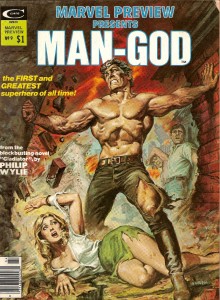 I’m not saying that Superman is Hugo Danner. Obviously, the two have their differences, and the Superman we know today has been formed by many hands. But the influence on the early Superman is undeniable.
I’m not saying that Superman is Hugo Danner. Obviously, the two have their differences, and the Superman we know today has been formed by many hands. But the influence on the early Superman is undeniable.
But here’s something you might find interesting: Superman is not the only major comics character to have been influenced by Hugo Danner. He has also influenced a major character from Marvel Comics, and I’m not talking about the Marvel adaptation of the first half of the novel titled “Man-God.” In one section of the novel, Danner finds himself in need of money, so he decides to exploit his superhuman strength for cash.
A man in his shirt sleeves stood up in the ring and bellowed, “The next contestant for the reward of fifty dollars to stay three rounds with Battling Ole and one hundred dollars to knock him out is Mr. H. Smith.” They cheered. It was a nasty sound, filled with the lust for blood. Hugo realized that he was excited. His knees wabbled when he rose and his hand trembled as he took the monstrous paw of the Swede and saw his unpleasant smile. Hugo’s heart was pounding. For one instant he felt weak and human before Battling Ole. He whispered to himself: “Quit it, you fool; you know better; you can’t even be hurt.” It did not make him any more quiet.
Then they were sitting face to face. A bell rang. The hall became silent as the mountainous Swede lumbered from his corner. He towered over Hugo, who stood up and went out to meet him like David approaching Goliath. To the crowd the spectacle was laughable. There was jeering before they met. “Where’s your mamma?”
“Got your bottle, baby?”
“Put the poor little bastard back in his carriage.”
“What’s this–a fight or a freak show?” Laughter.
It was like cold water to Hugo. His face set. He looked at Ole. The Swede’s fist moved back like the piston of a great engine into which steam has been let slowly. Then it came forward. Hugo, trained to see and act in keeping with his gigantic strength, dodged easily. “Atta boy!”
“One for Johnny–dear!” The fist went back and came again and again, as if that piston, gathering speed, had broken loose and was flailing through the screaming air. Hugo dodged like a beam of light, and the murderous weapon never touched him. The spectators began to applaud his speed. He could beat the Swede’s fist every time. “Run him, kiddo!”
“It’s only three rounds.”
The bell. Ole was panting. As he sat in his corner, his coal-scuttle-gloves dangling, he cursed in his native tongue. Too little to hit. Bell. The second round was the same. Hugo never attempted to touch the Swede. Only to avoid him. And the man worked like a Trojan. Sweat seethed over his big, blank face. His small eyes sharpened to points. He brought his whole carcass flinging through the air after his fist. But every blow ended in a sickening wrench that missed the target.
The third round opened. The crowd suddenly tired of the sport. A shrill female voice reached Hugo’s cold, concentrated mind: “Keep on running, yellow baby!”
So. They wanted a killing. They called him yellow. The Swede was on him, elephantine, sweating, sucking great, rumbling breaths of air, swinging his fists. Hugo studied the motion. That fist to that side, up, down, now!
Like hail they began to land upon the Swede. Bewilderingly, everywhere. No hope of guarding. Every blow smashed, stung, ached. No chance to swing back. Cover up. His arms went over his face. He felt rivets drive into his kidneys. He reached out and clinched. They rocked in each other’s arms. Dazed by that bitter onslaught of lightning blows, Ole thought only to lock Hugo in his arms and crush him. When they clinched, the crowd, grown instantly hysterical, sank back in despair. It was over. Ole could break the little man’s back. They saw his arms spring into knots. Jesus! Hugo’s fist shot between their chests and Ole was thrown violently backward. Impossible. He lunged back, crimson to kill, one hand guarding his jaw. “Easy, now, for the love of God, easy,” Hugo said to himself. There. On the hand at the chin.
Hugo’s gloves went out. Lift him! It connected. The Swede left the floor and crumpled slowly, with a series of bumping sounds. And how the hyenas yelled!
If that sounds familiar, you may recognize it from Spider-Man’s origin story in Amazing Fantasy #15 (where he bests a wrestler named Crusher Hogan) or the filmed retelling in Sam Raimi’s Spider-Man, where he faces down Bonesaw McGraw in order to win cash.
Looking at the book in comparison to later properties, it seems evident that Gladiator was a significant influence on them. Wylie never saw any profit from those other properties, however, and could take only small comfort in the fact that Siegel and Schuster were likewise denied the massive profits that accrued from their (adapted) creation. The book is in the public domain and is available as a free ebook from manybooks.net.
Next week, we’ll visit one of the seminal influences on the Darknight Detective himself, Batman, as we revisit The Curse of Capistrano.

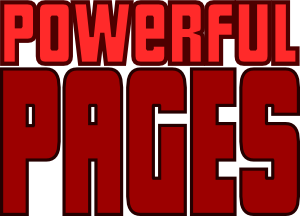
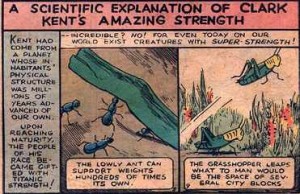
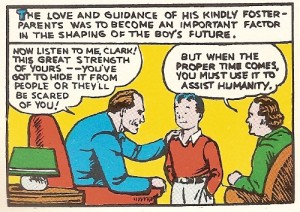
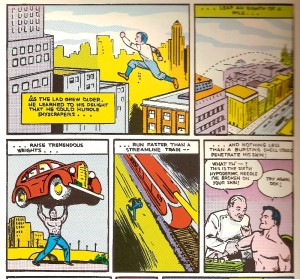



Pingback: Super Movies – Hulk | Hero Go Home